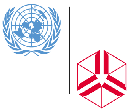
network of research and training centres and programmes
Issue 26: July-August 2003
 |
UNU Update | |
| The newsletter of United Nations
University and its network of research and training centres and programmes |
||
|
Issue 26: July-August 2003 |
||
|
Grant marks 'coming of
The Canadian International Development Agency (CIDA) has approved a C$3 million grant to UNU International Network on Water, Environment and Health (UNU-INWEH). The funds will finance core operations through 2006 and secure the future of the Hamilton-based organisation. Director Ralph
Daley said that the cash infusion marks the coming of age of INWEH, based
at McMaster University's campus in downtown Hamilton,
Ontario. INWEH was established in
Hamilton in 1996 to share Canadian and international water expertise with
developing countries, especially in
Africa and the Middle East. "CIDA now recognizes us as an important part of the UN system, a mainstream institute supported now by the Canadian government," said Daley. "We've stepped out of our inception period, our startup period, and it's really wonderful to have been accepted on a committed, longer-term basis." The
Hon. Susan E. Whelan, Minister for International Cooperation said CIDA
will provide $3 million through 2006 to support UNU-INWEH’s continuing
international operations from “In
a few short years, the United Nations University International Network on
Water, Environment and Health (UNU-INWEH) has become an important partner
in building capacity for water-related programs in the developing
world,” Ms. Whelan said in a letter to the academy’s International
Advisory Board. “I am proud
that The
work of UNU-INWEH is “vital,” she added.
“As you know too well, the United Nations estimates that
two-thirds of humanity will not
have enough safe water by 2025. In a world where the scarcity of fresh
water resources can easily lead to conflict, the Network not only
contributes to improved health and better sanitation, it also supports
poverty reduction and human security. “At
their recent UN
Under Secretary-General Hans van Ginkel, Rector of UNU, thanked
Prof. van Ginkel said the leveraging of funds by UNU-INWEH was particularly impressive. For every $1 spent and invested in projects by UNU-INWEH from the core funding it receives from Canada, other partners, donors, national governments, multilateral organizations and the private sector have spent $4. INWEH has a full-time staff of eight, with 20 to 30 people working abroad on various projects. Daley said that INWEH plans to focus on creating permanent water-management organizations and shepherding them through their first 10 years before turning them over to local authorities in Africa and the Middle East. With the recent appointment of Asian expert Zafar Adeel as assistant director, it also plans to expand activities in Asia. |
||
|
Copyright © 2003 United Nations University. All rights reserved. |